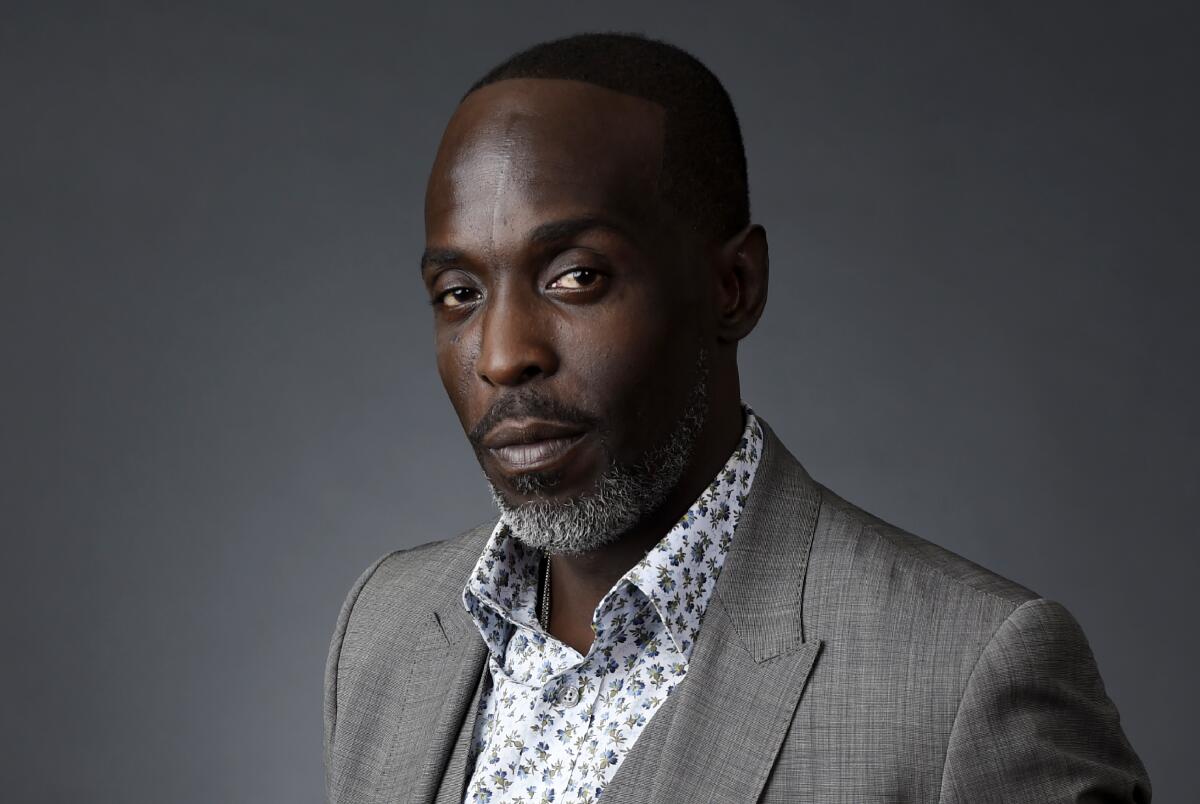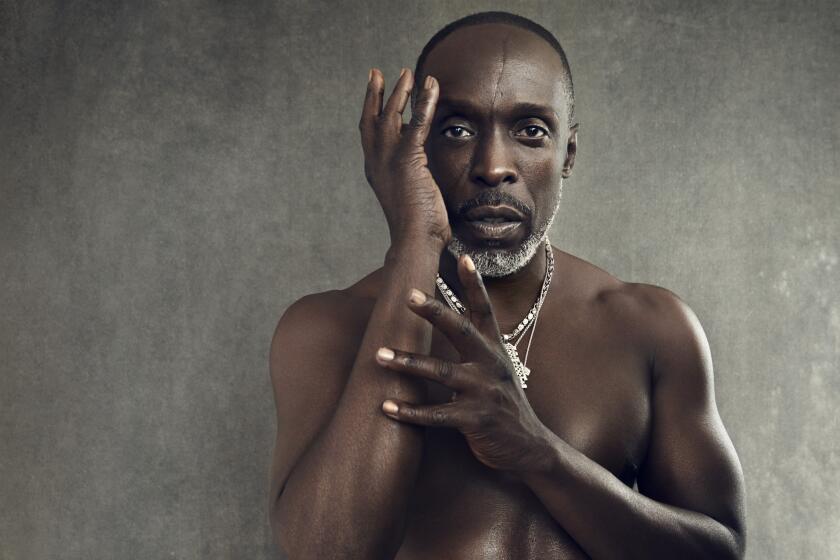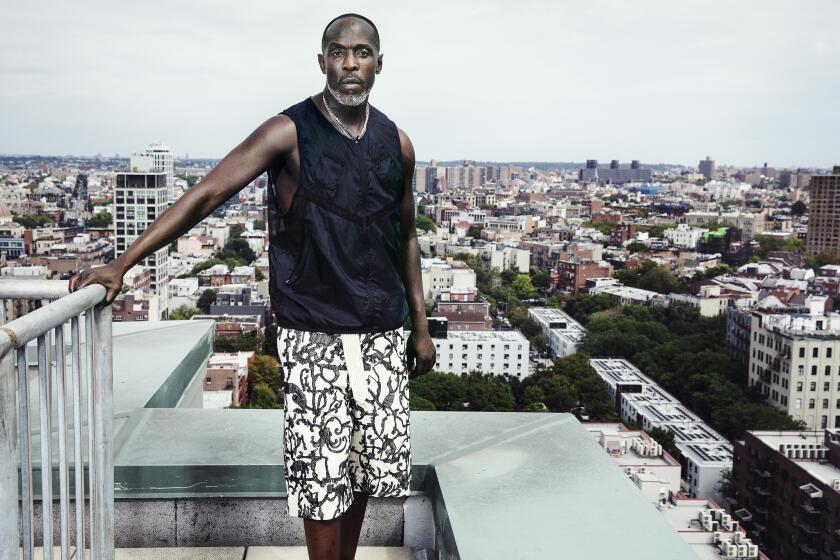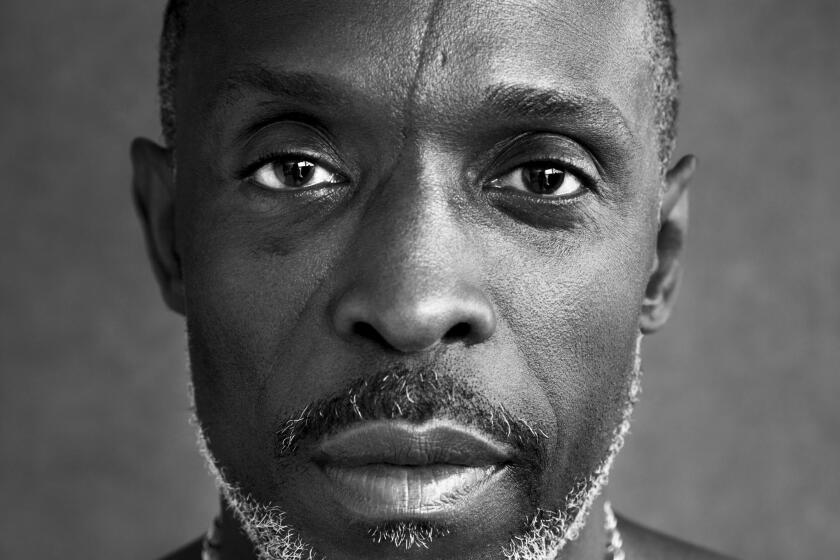Michael K. Williams book reveals he was ‘one false move from having it all slip away’

- Share via
Before his death, Michael K. Williams “wanted to shepherd projects” as a producer and create more opportunities for Black creatives in Hollywood, according to the co-author of the actor’s posthumous memoir.
In an interview with the Hollywood Reporter published Tuesday, writer Jon Sternfeld spoke about the trailblazing “Wire” star’s final years while praising him as a selfless artist and activist who “didn’t want to be in the spotlight” but rather “wanted to be the spotlight itself.”
“He admitted that he had suffered from what he called the ‘shut up and dribble’ mentality: just get on the stage and dance, or in front of the camera and act, and don’t tell these white people what you think,” Sternfeld said, using a phrase reclaimed by basketball player and producer LeBron James.
“He talked about understanding that his influence could get more Black filmmakers jobs or get Black perspectives into boardrooms, and that was important to him. He was dealing with a media and a Hollywood establishment that had maybe gotten used to him being very easygoing and he realized he wanted to fight for what he wanted to see in those worlds. A lot of his anger came from what he felt were these boxes that Black talent was put in. He would talk a lot about, we have to build our own table because they’re not inviting us to the table.”
Michael K. Williams, known for “The Wire” and “Boardwalk Empire,” was a sentimental Emmy favorite for his work on HBO’s “Lovecraft Country.”
Williams — who was vocal about his journey with drug addiction — died in September at age 54 after accidentally overdosing on a combination of fentanyl, p-fluorofentanyl, heroin and cocaine, according the New York City Office of Chief Medical Examiner.
In a foreword he penned for Williams’ book, “Scenes From My Life” — which hit shelves Tuesday — Sternfeld explained that he and the Emmy nominee had been working for more than two years “on various drafts and iterations” of the memoir, “which began as one thing and evolved into another.” After Williams died, Sternfeld completed the book based on “extensive interviews” he conducted with the prolific performer.
“Mike was open to sharing his personal story and experiences because he thought his journey, his openness itself, could offer solace to others,” Sternfeld writes in the intro. “He was adamant that the book he wanted to write shouldn’t be about self-glorification but was instead an honest chronicle of what he’d been through and how it informed the man he became.
“He wouldn’t want to hide the fact of what killed him — his addiction — and he spoke openly about the daily struggle the disease was for him and for so many others,” he continues. “There are references in this book to how he thought he was one false move from having it all slip away, about the fragility of life, and how it all could be snatched away at any moment: these are all directly from him. This is how Mike felt and how he spoke.”
‘The Wire’ and ‘Boardwalk Empire’ star acknowledged the pain he brought to his roles. But in his work he also found a respite.
Among vignettes culled from Williams’ Brooklyn upbringing, his early forays into dance and theater and his experiences in Hollywood, the actor’s memoir zeroes in on the youth criminal justice system. Williams — whose nephew, Dominic Dupont, was sentenced to 25 years to life in prison at just 19 years old — fought for criminal justice reform while visiting Dupont in prison and working on the documentary project “Raised in the System.”
The Emmy-nominated “Lovecraft Country” actor also co-founded We Build the Block, a New York-based organization that strives to replace over-policing with community-based approaches to safety.
“When he started, Mike wanted to make a book that was almost entirely through the lens of criminal justice,” Sternfeld told the Hollywood Reporter.
“That’s where his heart was, it’s what activated him. Mike’s a very humble person, he didn’t want to write a book that was like: look at me, I made it. But I thought we could tell parts of his personal story that inform the work that he does, so we picked scenes from his childhood, his teenage years. The final version isn’t necessarily an autobiography, it’s a look at the pain and the struggles. He wanted people to know he knows what they’re going through because he went through it, too.”
The beloved star of “The Wire” and “Lovecraft Country” graciously sat for portraits revealing the range of emotion — and the honesty — fans loved.
While they were collaborating on “Scenes From My Life,” Williams would get stopped by strangers who would “walk up to him and just start talking,” Sternfeld said. He added that Williams was “always friendly” to his fans because he understood that their exchanges “mattered to them. ... So it mattered to him.”
“It was never a burden, being a recognizable face in the community. It wasn’t the fame that fueled him but that connection,” Sternfeld says in the foreword.
“His friend and activist partner Dana Rachlin told me that Mike understood that his greatest role was not Omar Little or Chalky White but being a community member and doing ‘the work,’ partnering with and mattering in young people’s lives. And he grabbed it with both hands. In the week before his passing, he was in a really good place: optimistic, positive, energized.”
More to Read
Sign up for our Book Club newsletter
Get the latest news, events and more from the Los Angeles Times Book Club, and help us get L.A. reading and talking.
You may occasionally receive promotional content from the Los Angeles Times.












